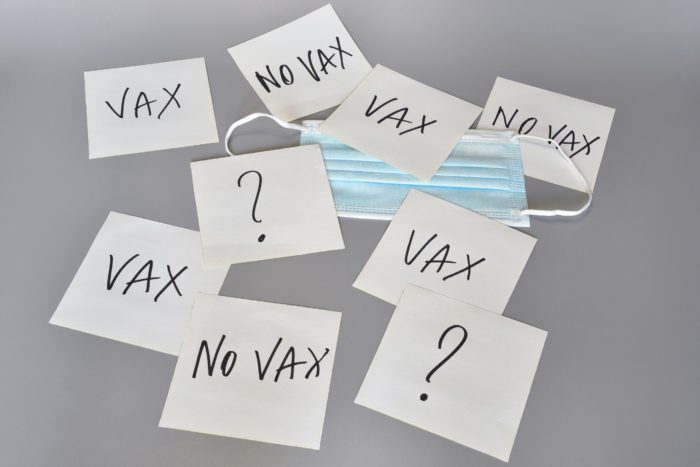


“Even-Though Risk Communication”: Mandatory COVID Vaccination
If your organization is grappling with conflicting thoughts about whether or not to mandate that all of your employees get vaccinated as a condition of employment, we urge you to carefully read the article below.
Risk communications concerns itself with making risk comprehensible and relatable to other risks, how to pay appropriate respect to the audience’s values related to the risk, how to predict the audience’s response to the communication, etc. A main goal of risk communication is to improve collective and individual decision making.
Crisis communications is aimed at raising awareness of a specific type of threat, the magnitude, outcomes and specific behaviors to adopt to reduce the threat.
Adapted from Wikipedia
Peter Sandman and Jody Lanard are experts in risk communications, considered by many in government, business and academia to be amongst the best in the business.
Recently, they opined on the subject of mandatory COVID vaccinations. Here’s what they wrote:
Millions of Americans clearly disagree with us, but we believe that getting a COVID-19 vaccine is a no-brainer. Putting aside some pretty rare medical contraindications, we don’t know of anyone who’s eligible to get vaccinated who isn’t better off getting vaccinated. That’s true even if you’re a teenage male at heightened risk of myocarditis and minimal risk of a serious COVID case. It’s true even if you have been infected and recovered and have proof of robust antibodies. We think getting vaccinated is a wise thing to do, period.
But whether COVID vaccine mandates are wise is a much closer call.
The case for COVID vaccine mandates is simple and persuasive. It’s a two-step proposition:

- Lots of people who decline to get vaccinated voluntarily roll up their sleeves when they’re told they have to or suffer some unacceptable consequence: losing their job, being kicked out of restaurants and other venues, etc. If the goal is to increase vaccine uptake, mandates work.

- Increased vaccine uptake is a worthwhile goal – good for literally everybody: good for the people who reluctantly got vaccinated; good for their family and friends and coworkers and everyone they come into contact with; and good for the society at large. And this isn’t a small good. We’re talking about alleviating the worst public health crisis in a century.
In our judgment this is a strong case – far stronger, for example, than the argument for mandatory flu vaccination of healthcare workers. (We’ve written about that a lot – see for example here and here.)
The case against COVID vaccine mandates is longer and more complex. It consists of a list of arguments. Here are five of the strongest.

- Mandatory vaccination is a clear infringement on freedom and bodily integrity. It’s not an unprecedented infringement. But it is an unusual infringement – all the more so if the mandate is imposed by the federal government against nonconsenting adults. “My body myself” and the abortion rights comparison is not perfect, but it’s not completely off-base either.

- The actual harm done by voluntarily unvaccinated individuals is mostly to other voluntarily unvaccinated individuals. Individuals who are involuntarily endangered – such as those who are immunocompromised – have not yet been urged to protect themselves, beyond standard social distancing and mask-wearing. For instance, they have not been urged to wear N95 respirators when in close company with people whose vaccine status is unknown. Is it fair to put the burden of protecting the immunocompromised so one-sidedly on the unvaccinated?

- When people are coerced into doing something they greatly prefer not to do, the resulting outrage is bad for the society in many ways. Polarization is increased. Morale is undermined. Resentment builds. The collateral damage is likely to last long after the COVID pandemic is history.

- The outrage aroused by coercion also tends to increase people’s cognitive opposition to whatever they’re being forced to do. Thus, many people forced to get COVID vaccinations against their will are likely to become far more deeply committed to anti-vaccine views than they were previously. And their opposition may generalize, turning them into opponents of other vaccines, and perhaps of other public health measures as well.

- The fact that vaccine uptake is strongly correlated with political views means that most of the people forced to get vaccinated see themselves as being forced by “the other” – by representatives of an ideology they despise and distrust. It’s not just the mandate; it’s the source of the mandate and the company it keeps. For many of the mandate’s “victims,” mandatory vaccination becomes a symptom and an emblem of their oppression.
In our judgment this is a strong case too.
Whichever side of this argument you are on, if you think it’s a no-brainer you’re not in the argument at all. And if you claim to think it’s a no-brainer, you are sacrificing any shot at persuading anyone on the other side.
If you acknowledge that your opponents’ case is strong, some of them just might be open to the argument that your case is even stronger. If you claim they have no case, you have no shot.
We call this “even-though risk communication…”
For the rest of this excellent article, be sure to click here.